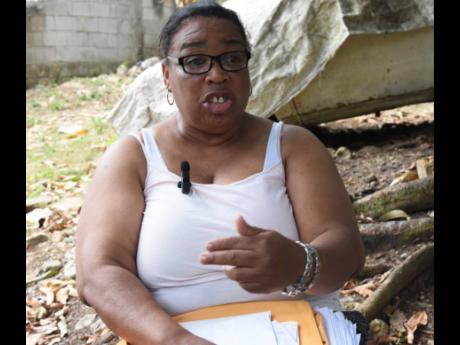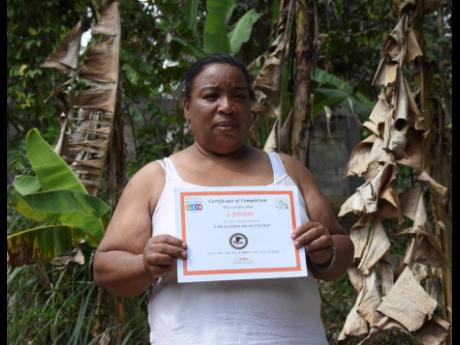‘I was in hell’
• Deported drug mule threatens to sue US federal authorities for inhumane treatment while incarcerated • Without strong evidence case hard to prove, says immigration lawyer
WESTERN BUREAU:
Joy Thorpe, a convicted drug mule and the only female among a group of 37 Jamaicans recently deported, is threatening to sue the United States Federal Bureau of Prisons for the inhumane and cruel conditions she said she faced behind bars.
The 54-year-old cosmetologist from Orange district, St James, who was caught trafficking half kilo of cocaine at the John F Kennedy Airport in New York in 2020, said her human rights were trampled on at the Aliceville Federal Correctional Institution in Alabama.
She is calling for an urgent reform of the criminal justice system in the US and better treatment for non-immigrants.
Her husband, who was travelling with her when she was held, received one year and one day sentencing for the crime, while Thorpe served 22 months.
Almost three weeks back in Jamaica and taking full responsibility for carrying the illegal substance, she is also questioning the length of her sentence.
“I was in hell. I went into a state of depression, and I want Jamaicans to know that prison is a serious place to be and the type of cruelty they have in America, we Jamaicans don’t have it here, much as some people sleep on the ground here,” Thorpe told The Sunday Gleaner last week.
She said at least the prisoners here are served chicken back, but in Aliceville they are served “nastiness”.
Stricken with type 2 diabetes and hypertension, she said she had to wait for days to get insulin, while she went to bed many nights without food because “what they served was more suited for hogs”.
“Rice and water chicken was the nasty food we were served and you have to fight for your food, so I stopped going to the town hall for food,” she said.
“Some days I could not come off my bed, it pained just to get up and the fact they held my medicine back is proof they wanted me dead.”
As a diabetic she requires insulin twice per day, however, she said she received it only when they felt like giving it to her.
“You know if somebody don’t give you your diabetic medicine which is insulin, is try they trying to kill you?” she argued.
SAVED DOCUMENTS
To strengthen her case against the US federal prison system, Thorpe saved several documents as proof for the long period she had to wait to get medical service, which she showed to The Sunday Gleaner.
On April 27, 2022, she filled out a sick bay form stating that she was having pelvic bleeding and strong pain, which caused her not to be able to sit up. However, she didn’t see a medic until May 9.
Again on September 8, 2022, she pleaded for help with what she said was a fibroid. “I am feeling big pain in pelvic and it cost (cause) blood to come out for four days. I could not sleep on my side or my back. I need help,” she stated on the inmate request form. She received help on the 14th, six days later.
On June 6, 2022, she alerted the prison of “a vein that popped out” on the side of her head, but was not seen until three days later.
Thorpe also revealed that she went to prison weighing 268 lb and came out 30 lb lighter. She also complained of having to sleep in very cold conditions.
Thorpe’s complaints come in the wake of reports last week of an uproar and threats of a lawsuit by the family of a Georgia man who allegedly died after being eaten by bed bugs and other insects while in a filthy jail in Fulton County.
Lashawn Thompson, 35, was discovered dead inside a “disgusting” cell at the Fulton County Jail in Atlanta, Georgia, on September 13, 2022 – three months after he was arrested on a charge of misdemeanour simple battery, said Michael Harper, a lawyer for the family.
HARD TO PROVE
The 54-year-old first-time offender, who gave The Sunday Gleaner team a tour of the fruit-laden acres of land left to her by her parents in Orange district in St James, said she became involved in drugs because she owed money to the person who gave her the substance to transport.
“I couldn’t pay her back and agreed to carry the drugs in exchange,” Thorpe admitted.
Efforts to reach Thorpe’s court-appointed lawyer proved futile; however, King’s Council Wayne Golding, who is not representing her, said her case is not unique, but is hard to prove without strong evidence and the disadvantage she faces is not being in the country where she was detained.
“If you don’t have strong documentation, it is going to be difficult to prove,” said Golding, adding that she could appear virtually in court if her case were to proceed.
While not discouraging Thorpe, he cautioned that a lawsuit could take years. However, he suggested that an advocacy group such as the American Civil Liberties Union may be able to assist her, pointing out that there are safeguards within the prison system, including a scoresheet and a sentencing guideline, that could be useful.
The immigration attorney is also advising Jamaicans that they should reach out to their consulates in the countries where they are incarcerated, where they can file complaints or be monitored.
Thorpe said she only spoke with the consulate while being detained for three months by Immigration Custom Enforcement (ICE).
Golding also noted that, “because you are an immigrant, it doesn’t mean you are going to be treated differently. I am sure bad things happen, but generally, especially in the federal facility, they are much more stringent on policing what is happening”.
He also noted that the food is like slop.
“The food is not going to be home-cooking or anything close. The accommodations definitely not going to be anything close to home, but people go into these facilities and they do have genuine complaints, but sometimes it doesn’t rise to the level of what somebody would think is abusive,” said the Jamaican-born attorney.
NO COMPLAINTS FROM THORPE
Jamaican Consul General in Miami, Florida, Oliver Mair, said the consulate is always ready to support incarcerated Jamaicans who reach out with concerns, especially where it relates to human rights violations. But noted that the consul’s security attaché said that no report was received from Thorpe or any other inmate about Aliceville.
“The prison facilities generally offer inmates free calls to their respective consulates,” Mair told The Sunday Gleaner, adding that their security attaché also does periodic prison visits across the Southern US, especially facilities from where they receive complaints.
He noted, “During these visits we listen to the expressed concerns and communicate any significant issues like human rights violations and health concerns with the authorities. Most prisons, however, have well established protocols to handle issues like sickness in the facilities.”
“The consulate does conduct interviews with deportees set for return to Jamaica. Our security attaché interviewed Mrs Thorpe upon completion of her sentence when she was scheduled for return to Jamaica, at which time she communicated her eagerness to return home,” Mair said.
Thorpe returned home with qualifications from several short courses she did during detention, including Bible studies and anger management, which she hopes to put to good use.
She has sworn to never go back to the United States nor traffic drugs.




